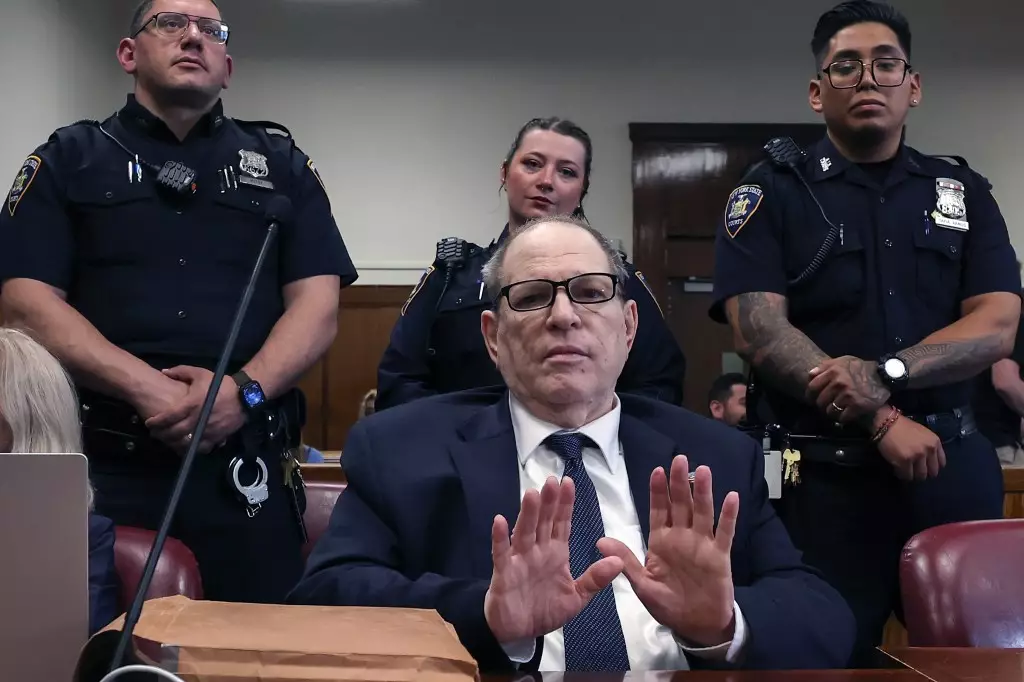The courtroom drama surrounding Harvey Weinstein has transformed into a spectacle questioning not just the ethics of the legal system but also the intricacies of personal accountability. His decision not to testify during his New York retrial warrants a critical examination. While Weinstein’s legal team justifies this strategy as a matter of caution, it inadvertently raises red flags about the true nature of his defense. To mute his own voice is more than mere silence; it’s a calculated maneuver that allows him to evade direct accountability while still managing to shape public perception in other venues, such as through media interviews.
The rationale shared by his spokesperson, Juda Engelmayer, that testifying could subject Weinstein to scrutiny greater than the charges at hand, feels disingenuous at best. If one encounters such serious allegations of sexual assault, would the instinct not be to confront those accusations head-on? Instead, Weinstein’s unwillingness to step into the witness box suggests a reluctance to be held accountable for his past actions, which is a troubling message to send, especially in the backdrop of the #MeToo movement.
Manipulating the Narrative
The absence of Weinstein’s testimony allows him the luxury of control over the narrative; a narrative that he has aggressively promoted through carefully timed media strategies. His jailhouse interview with Candace Owens exemplifies what can only be described as a guerrilla public relations campaign. In this light, Weinstein attempts to position himself as a misunderstood victim of a societal backlash—a position that conflicts starkly with the experiences of countless survivors of sexual abuse. This presentation is not just about self-defense; it’s about rewriting the storyline to favor the man whose actions undeniably contributed to a predatory culture.
Public opinion and societal shifts since the #MeToo movement have put pressure on institutions to prioritize the voices of survivors rather than those of perpetrators. Therefore, Weinstein aiming to play the victim card in such a glaring manner rings hollow when juxtaposed against the victims he has left in his wake. His insistence on proclaiming that “justice has to know the difference between what is immoral and what is illegal” further exemplifies an evasion of moral responsibility, as if these two concepts can exist separately from one another in this context.
Lawyers in the Shadows
One cannot overlook the pivotal role of Weinstein’s defense attorney, Arthur Aidala, in navigating this tumultuous legal landscape. Aidala’s use of phrases like “friends with benefits” tries to diminish the severity of the accusations and position Weinstein’s interactions in a more benign light. Such depictions tilt dangerously toward normalizing inappropriate behavior, simultaneously risking the hard-won progress made by those advocating for victims of sexual violence.
It’s remarkable that Weinstein’s legal team seems to thrive on the ambiguity of consent, sidestepping the hard truths that complicate any narrative of mutual agreement while underlining the systemic failures that allow such perspectives to gain traction. This tactic echoes a broader cultural pattern where powerful individuals manipulate the legal system to shield themselves from the consequences of their actions.
The Broader Implications
In the broader scheme, Weinstein’s trial signifies more than his personal misdeeds; it reflects societal struggles with ethics, justice, and accountability. His tactical silence during this retrial may serve to protect him legally, but it does nothing to foster genuine progress in societal attitudes toward sexual assault. We stand at a critical juncture: as victims continue to unearth their truths, the systemic barriers ingrained in our legal landscapes still afford opportunities for strategic evasion.
As the jury deliberates, the implications of their decision extend unchecked into the realm of public discourse and justice itself. They hold the power to make a statement not just about Weinstein, but about the enduring fight for accountability in a society that has too long tolerated the voices of the powerful over the silenced vulnerable. Without doubt, the outcome of this case will reverberate far beyond the courtroom walls, sparking discussions that challenge or fortify societal norms surrounding consent and justice.


Leave a Reply